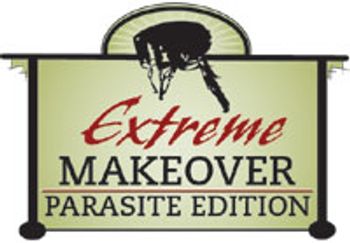
Remodel your ho-hum parasite prevention program.

Portia Stewart is a pun-loving editor who spends her days arguing the differences between cats and commas (commas are a pause at the end of a clause, while cats have the claws at the end of the paws). She is a minion to two cats and a dog.
She's also the mastermind behind the practical articles, tools, videos, and solutions for managers, technicians, assistants, and veterinary receptionists that you find on dvm360.com. Have a great idea that you want to share with your colleagues? Get in touch! firstline@ubm.com

Remodel your ho-hum parasite prevention program.
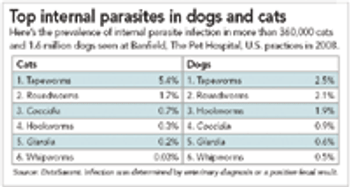
Remodel your parasite prevention program to help pets and people.

Tips from doctors who offer dentistry as demand for other services declines.

Ever wake up in the middle of the night and worry about work? What's on your mind as you toss and turn, silently seething over the sleep you're missing and the problem that won't stop rolling around in your mind? We wanted to know. So in March, we asked. Here's what you said:

A discussion guide with real-life client complaints and role-playing scripts to soothe pet owners.

And her veterinarian explains how he does it.
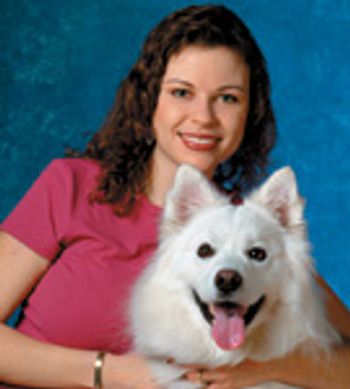
Here in the Midwest, it's been a stormy season. Some states have seen record numbers of twisters, and we've had to kennel our dog during thunderstorms so many times this year we've stopped counting. If you've ever lived in an area where tornadoes are common, you know the chill the tornado siren sends when it starts to moan.

"The waiting area smelled of urine and pet odors." "The surroundings were dirty and depressing." Don't let these comments be from your clients.
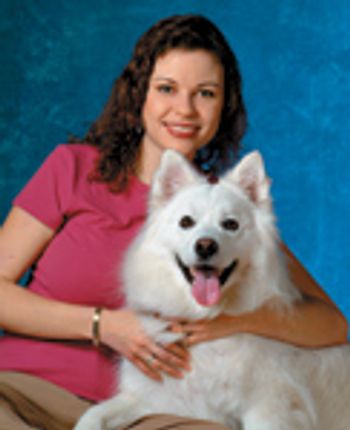
Sandy scratches. A lot. When her leg gets going, it makes a sound against the floor like a hammer driving a nail. My mother-in-law, Jane, first noticed Sandy's behavior a few months ago. When Jane took Sandy, a mid-sized 13-year-old mixed-breed pooch, to the veterinarian, he suggested a diet change to curb the scratching that makes her so uncomfortable.
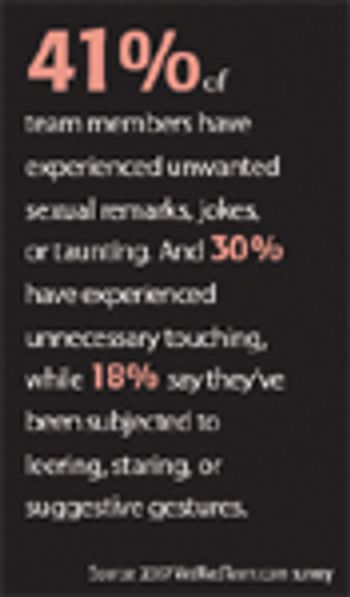
He's watching you. You can't concentrate, you're afraid to be alone with him, and the comments won't stop. Sexual harassment can be relentless, consuming your work and your life. It happened to these women-and it could happen to you. Here's what every woman (and man) should know about sexual harassment.

Use simple language and reinforce the benefits when you offer a recommendation, says Dr. Ernest E. Ward Jr., a Veterinary Economics Editorial Advisory Board member and owner of Seaside Animal Care in Calabash, N.C.

Every member of your team contributes to the client's experience, says Dr. Ernest E. Ward Jr., a Veterinary Economics Editorial Advisory Board member and owner of Seaside Animal Care in Calabash, N.C. Dr. Ward spoke at Firstline Live at CVC East in Baltimore and gave tips to help team members create an experience that builds the value of the service practices offer.

There's a simple reason my practice's compliance rate was twice the AAHA compliance study numbers. It's communication," says Dr. Ernest E. Ward Jr., a Veterinary Economics Editorial Advisory Board member and owner of Seaside Animal Care in Calabash, N.C. Dr. Ward spoke at Firstline Live at CVC East in Baltimore about how to improve communication and boost compliance.
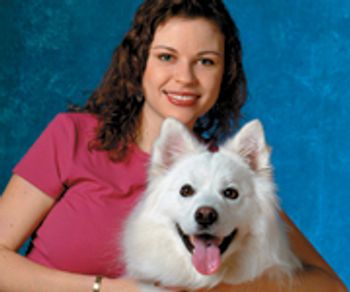
We haven't told our dog, Sebastian, that he'll have a new sibling this August. When our son was born a few years ago, Sebastian was the most enthusiastic cheerleader you could ask for. So I'm hoping he'll revive that same joyous spirit when he has another little human brother or sister. These transitions take patience, but there are many little rewards along the way.

Almost everyone struggles at some point to keep his or her pets' at a healthy weight. I know how important it is. And still, we've had to fight hard to win the battle of the bulge.
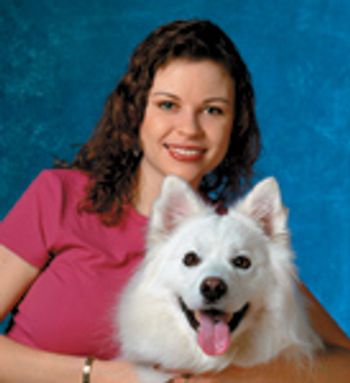
Mary's a customer service guru and a gossip. Lisa's a whiz with lab work, but she tends to grouch when she's pressed and running behind. These are the perfect set-ups for little betrayals.

Most of us aren't very comfortable talking about ourselves. It's a hard skill to master, and too often it feels like you're bragging. But if you're not talking about what you do well, how will others know? If you're waiting for them to catch you in the act, you may have a long wait.

Feeling sapped? Rundown, tired, out of sorts? Oh yeah. It's so easy to give and so hard to say no. You do it all the time. It's the 15 minutes at the end of the day you spend making a comfy bed for a sick pet or the extra walk you sneak in for your favorite boarder. Or maybe you volunteer to stay late to finish filing or clear the clutter from the reception area. The truth is, you do a lot.
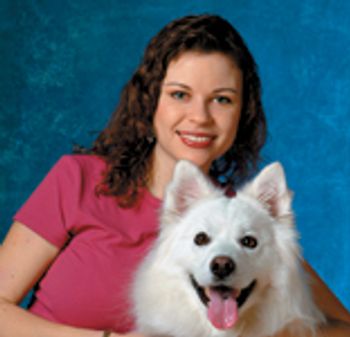
For the first few months after I gave birth to my son, I was pretty sure I wanted to quit my job. I loved my work, but those 12 weeks I'd spent at home getting to know this interesting little person weren't enough. Every morning, when I sent him off to day care, the guilt crept in. By mid-morning, it was an ache. And by 3:30 p.m., I could only think about rushing home for a few minutes with my son before bedtime.
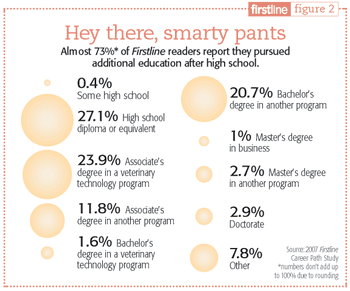
AVMA data shows 56,092 practicing veterinarians in the United States at 27,123 practices. That's about two doctors in each practice. And in two-doctor companion animal practices, the National Commission on Veterinary Economic Issues (NCVEI) reports a staff-to-doctor ratio of 2.99. That's six team members and two doctors in the average companion animal practice.

You can probably look down the street and see someone you know doing a job similar to the one you do every day. The only difference: The patients at your practice are pets, and theirs are people.
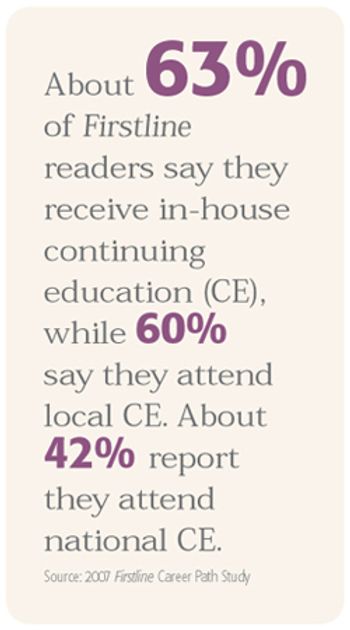
Seventy percent of Firstline readers say they need in-house training to take the next step in their career, according to the 2007 Firstline Career Path Study. And about 68 percent say they also require formal training to grow in their jobs.
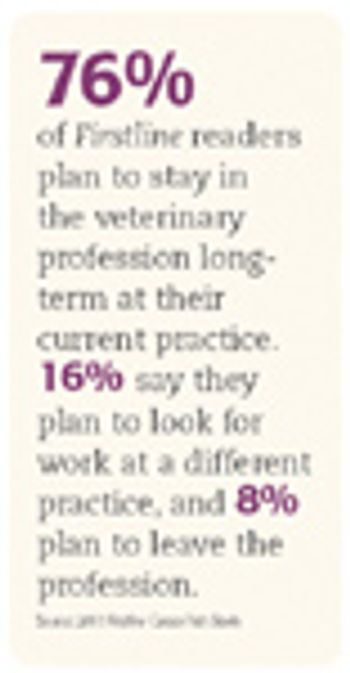
What's the difference between a job and a career, and which would you use to describe the work you do? While some team members deliberately take the veterinary path, others just stumble across it by accident. Regardless of how or why, let's see what the label you've chosen means.

Check out the answers to your questions about your salary and benefits, how to handle team conflict, what clients want, who owns pets, and data on 11 other critical trends.
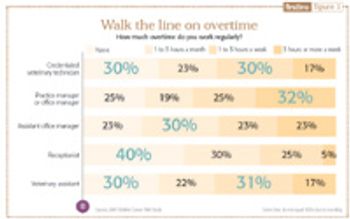
Yes, but it takes practice. Firstline readers who are 46 to 55 years old are most likely to work more than three hours of overtime, while those who are 56 or older report they're most likely to work no overtime.
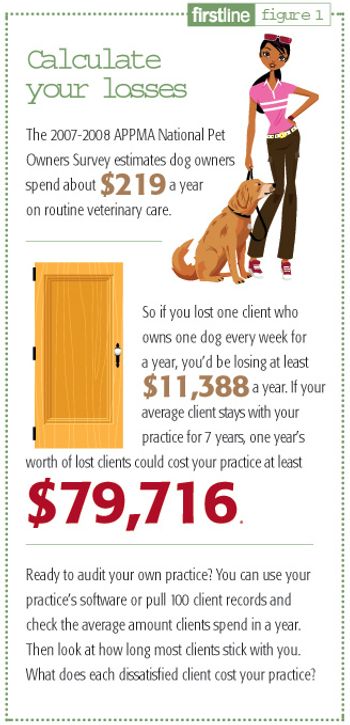
It's probably more than you think. For example, a typical dog owner spends $219 a year on routine veterinary care, while a cat owner spends $175, according to the 2007-2008 APPMA National Pet Owners Survey (see Figure 1).
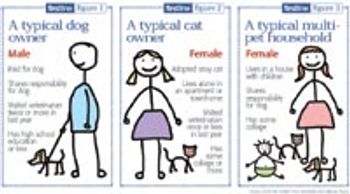
The number of pet-owning households continues to grow, according to the 2007-2008 APPMA National Pet Owners Survey. About 63 percent of households own pets today, a 7 percent increase from 1988.
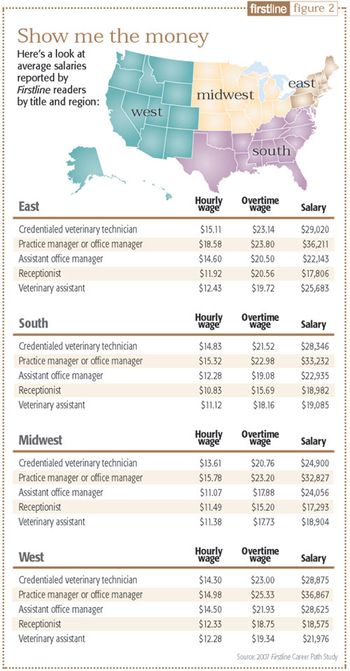
Pick the right region, check your salary. Too bad it's not that easy. While the regional wage data by title may reveal trends in your pay, it won't tell you what you should be making. Why not?
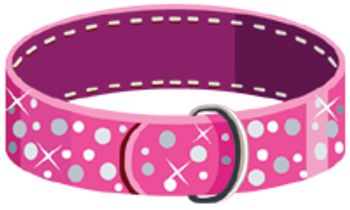
Where does Rover sleep? How much do pet owners spend every year? For answers to these questions and more, explore this list of fun facts about pets and the people who love them.

There are some topics you just don't feel comfortable talking about, not even with your closest friends. So imagine opening up and sharing your deepest, darkest secrets with 40,000 complete strangers. That takes a lot of courage, doesn't it? That's just what authors Shawn McVey and Joanne Light have done this month. They're sharing their own intensely personal experiences with the hope that they can help others.